To use a parameter-based CRUD API made by Python in Laravel, you can use Laravel's built-in HTTP client to send HTTP requests to the Python API endpoints.
Here's an example of how to use parameter-based CRUD API made by Python in Laravel:
// app/Http/Controllers/BookController.php
namespace App\Http\Controllers;
use Illuminate\Http\Request;
use Illuminate\Support\Facades\Http;
class BookController extends Controller
{
public function index()
{
$response = Http::get('http://localhost:5000/books');
$books = $response->json();
return view('books.index', compact('books'));
}
public function create()
{
return view('books.create');
}
public function store(Request $request)
{
$response = Http::post('http://localhost:5000/books', [
'title' => $request->input('title'),
'author' => $request->input('author')
]);
return redirect()->route('books.index');
}
public function show($id)
{
$response = Http::get('http://localhost:5000/books/'.$id);
$book = $response->json();
return view('books.show', compact('book'));
}
public function edit($id)
{
$response = Http::get('http://localhost:5000/books/'.$id);
$book = $response->json();
return view('books.edit', compact('book'));
}
public function update(Request $request, $id)
{
$response = Http::put('http://localhost:5000/books/'.$id, [
'title' => $request->input('title'),
'author' => $request->input('author')
]);
return redirect()->route('books.index');
}
public function destroy($id)
{
$response = Http::delete('http://localhost:5000/books/'.$id);
return redirect()->route('books.index');
}
}
Here, we're using Laravel's HTTP client to make requests to the Python API endpoints. In each method, we're sending a request to the corresponding endpoint and passing any required parameters as an array. We're also using the "json" method to parse the response as JSON.
Note that you'll need to replace "http://localhost:5000" with the URL of your Python API. Also, make sure that your Python API is running and accessible from your Laravel application.
=================================================================
// Example of the store() method in the BookController
use Illuminate\Http\Request;
use GuzzleHttp\Client;
class BookController extends Controller
{
public function store(Request $request)
{
// Create a new GuzzleHttp client
$client = new Client();
// Send a POST request to the Python API endpoint
$response = $client->post('http://localhost:5000/books', [
'form_params' => [
'title' => $request->input('title'),
'author' => $request->input('author'),
// Add any other necessary parameters here
]
]);
// Redirect to the index page
return redirect()->route('books.index');
}
}
7.Define the Laravel routes
Open the routes/web.php file
Define routes for each CRUD operation that point to the corresponding controller method
// Example of the route definition for the store() method in the BookController
Route::post('/books', [BookController::class, 'store'])->name('books.store');
8.Create the Laravel views
Create views for each CRUD operation: index.blade.php, create.blade.php, edit.blade.php, and show.blade.php
Use Laravel's built-in form helpers to create forms that submit data to the controller methods
<form method="POST" action="{{ route('books.store') }}">
@csrf
<div>
<label for="title">Title:</label>
<input type="text" id="title" name="title" required>
</div>
<div>
<label for="author">Author:</label>
<input type="text" id="author" name="author" required>
</div>
<!-- Add any other necessary form fields here -->
<button type="submit">Create Book</button>
</form>
And that's it! You should now be able to use the parameter-based CRUD API made by Python in your Laravel project. You can repeat steps 5-8 for each
// Example of the route definition for the store() method in the BookController
use Illuminate\Http\Request;
use GuzzleHttp\Client;
Route::post('/books', function (Request $request) {
// Define the Python API endpoint URL
$url = 'http://localhost:5000/books';
// Define the request method
$method = 'POST';
// Define the request body
$data = [
'title' => $request->input('title'),
'author' => $request->input('author'),
// Add any other necessary parameters here
];
// Initialize the Guzzle HTTP client
$client = new Client();
// Send a request to the Python API endpoint
$response = $client->request($method, $url, ['form_params' => $data]);
// Redirect to the index page
return redirect()->route('books.index');
})->name('books.store');
Sure, here's a step-by-step example of how to create a parameter-based CRUD API in Python and use it in Laravel:
Create the Python API
Create a new Python project using your preferred framework (e.g. Flask, Django, etc.)
Define API endpoints for each CRUD operation (GET, POST, PUT, DELETE)
Add necessary libraries for API implementation (e.g. Flask-Restful)
Test the Python API
Start the Python API server and test each API endpoint using a tool like Postman
Ensure that the API can successfully create, read, update, and delete data
Create a Laravel project
Create a new Laravel project using the command laravel new my-project
Navigate to the project directory using cd my-project
Install the Guzzle HTTP client
Use composer to install the Guzzle HTTP client by running the command composer require guzzlehttp/guzzle
Define the Laravel routes
Open the routes/web.php file
Define routes for each CRUD operation that point to a new controller method that uses the Guzzle HTTP client to send requests to the corresponding Python API endpoint
php
Copy code
// Example of the route definition for the store() method in the BookController
use Illuminate\Http\Request;
use GuzzleHttp\Client;
Route::post('/books', function (Request $request) {
// Define the Python API endpoint URL
$url = 'http://localhost:5000/books';
// Define the request method
$method = 'POST';
// Define the request body
$data = [
'title' => $request->input('title'),
'author' => $request->input('author'),
// Add any other necessary parameters here
];
// Initialize the Guzzle HTTP client
$client = new Client();
// Send a request to the Python API endpoint
$response = $client->request($method, $url, ['form_params' => $data]);
// Redirect to the index page
return redirect()->route('books.index');
})->name('books.store');
Define the Laravel views
Create views for each CRUD operation: index.blade.php, create.blade.php, edit.blade.php, and show.blade.php
Use Laravel's built-in form helpers to create forms that submit data to the routes defined in step 5
<form method="POST" action="{{ route('books.store') }}">
@csrf
<div>
<label for="title">Title:</label>
<input type="text" id="title" name="title" required>
</div>
<div>
<label for="author">Author:</label>
<input type="text" id="author" name="author" required>
</div>
<!-- Add any other necessary form fields here -->
<button type="submit">Create Book</button>
</form>
And that's it! You should now be able to create a parameter-based CRUD API in Python and use it in Laravel using the Guzzle HTTP client. You can repeat step 5 for each CRUD operation.
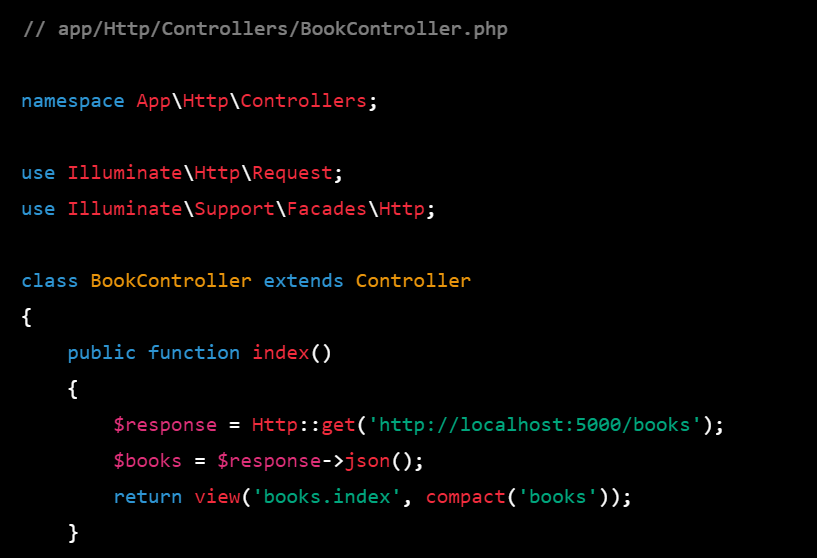
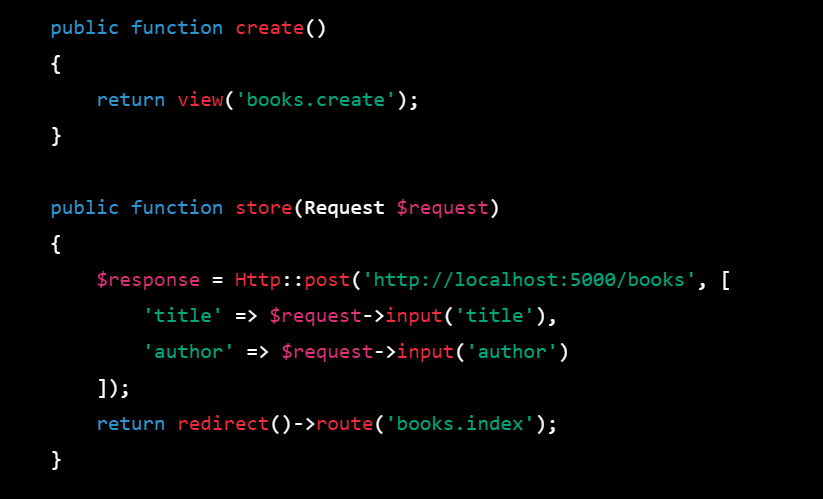
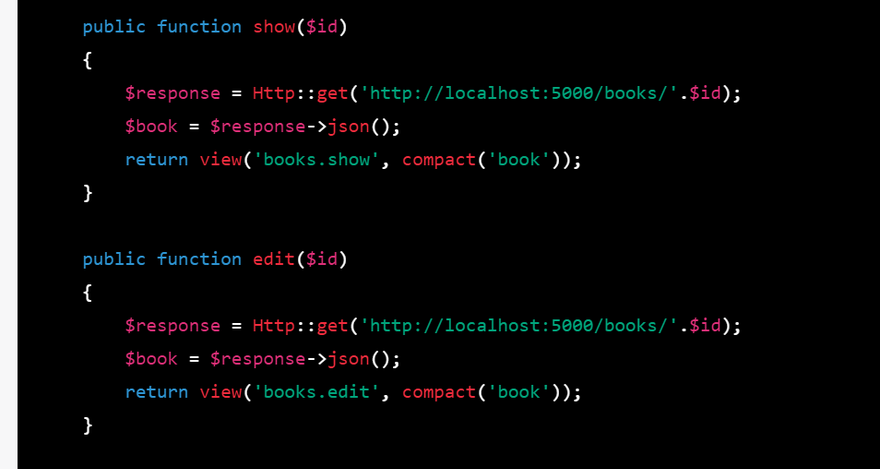
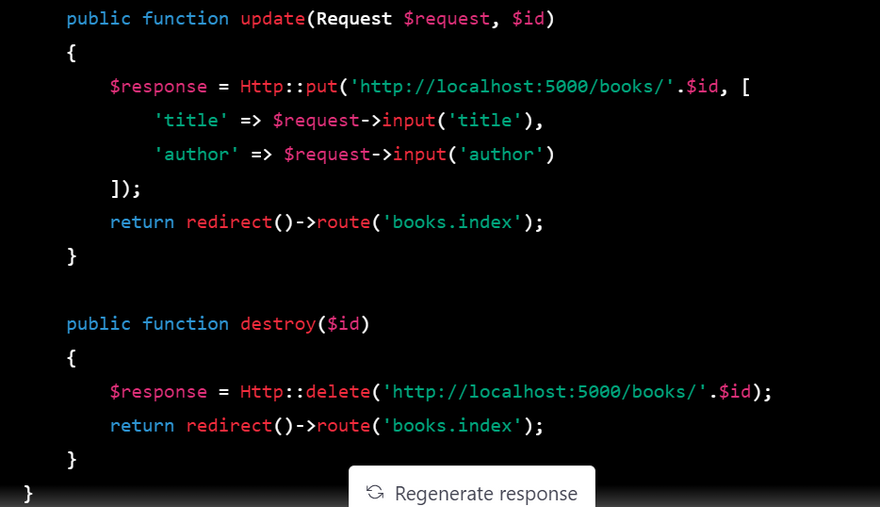

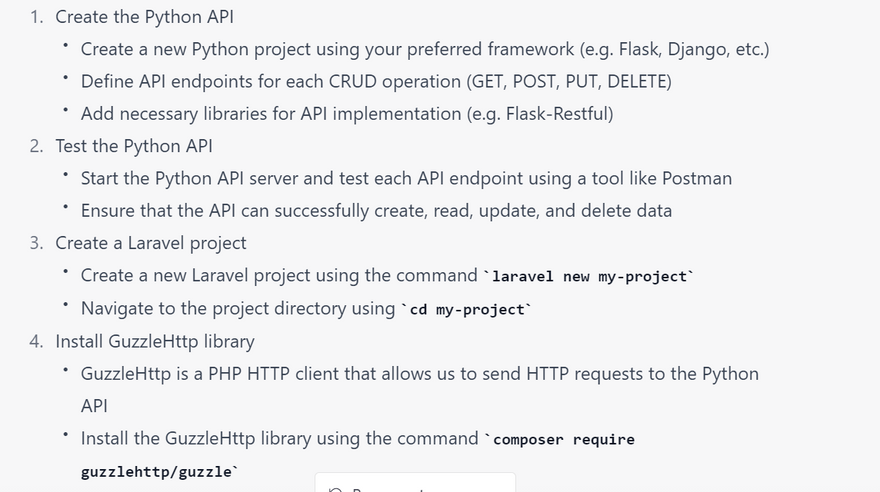

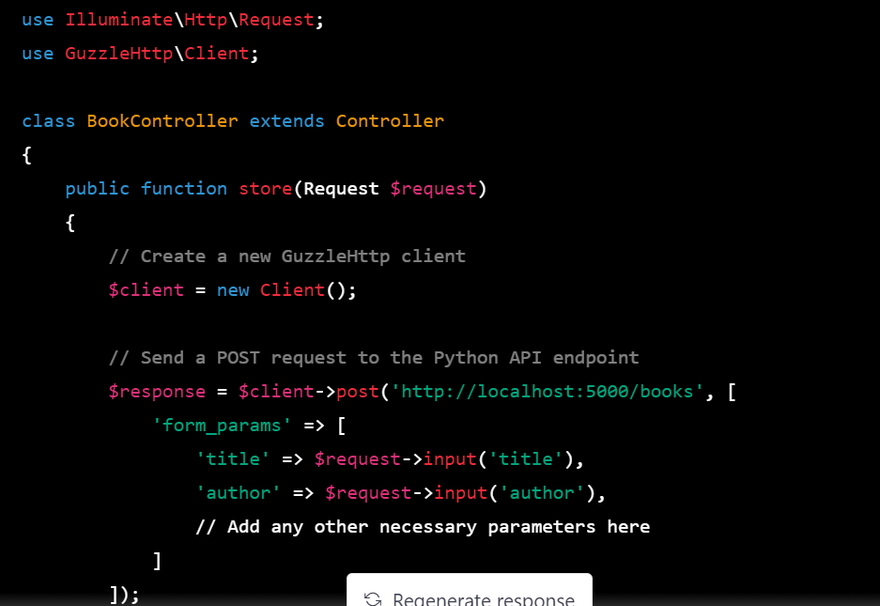


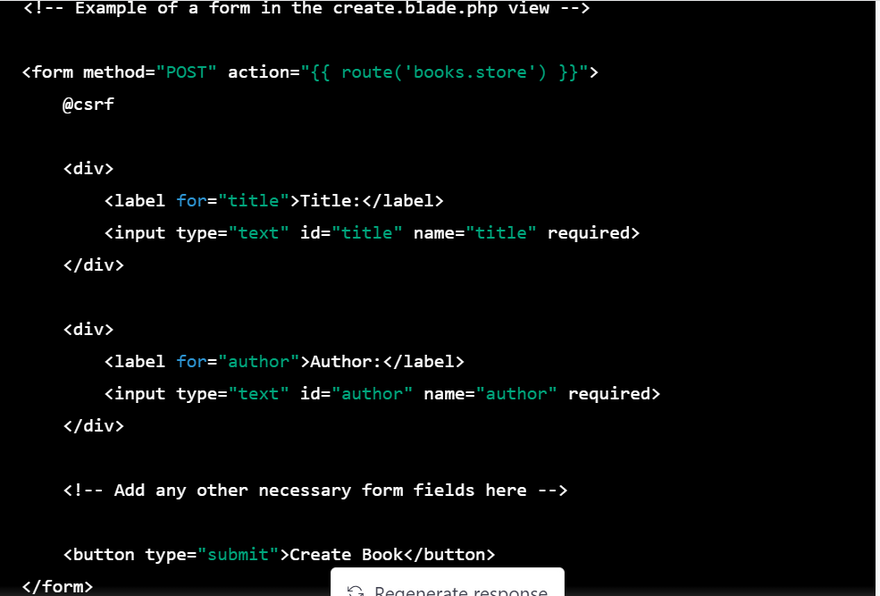


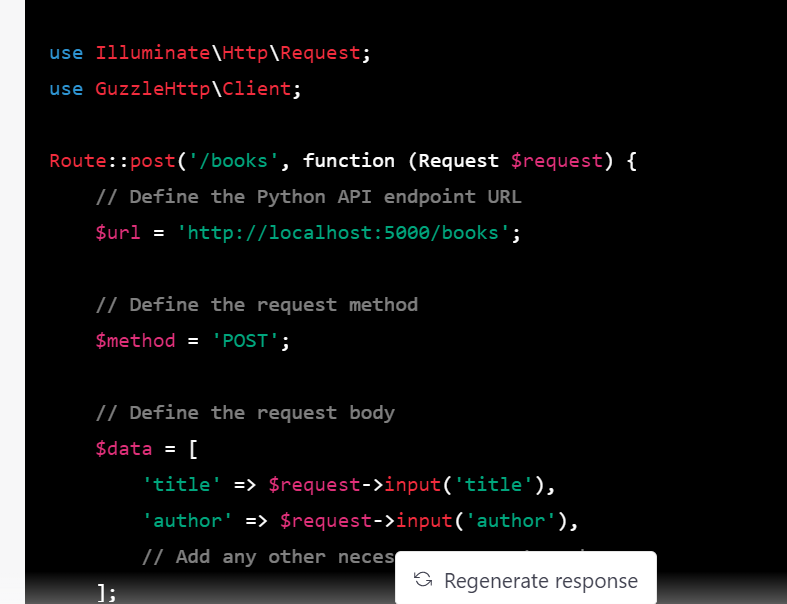



Top comments (0)